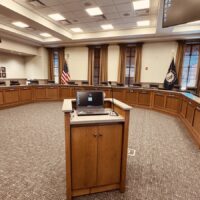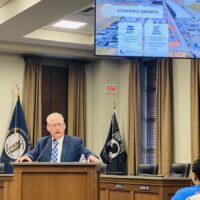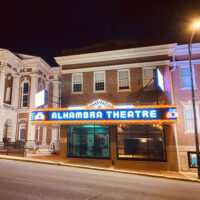Voters got their chance at a forum Thursday night to speak publicly about a potential switch to nonpartisan city elections — and most of them questioned how that would affect voter turnout and if it would diminish racial and economic diversity on Hopkinsville City Council.
“I wonder about those unintended consequences,” said Bernard Standard, the retired executive director of the Human Rights Commission.
Standard was one of nine people who commented at the forum that the Nonpartisan Elections Citizens Committee held in city council chambers. No one spoke clearly in favor of nonpartisan elections.
Nonpartisan elections “tend to produce elected officials more representative of the upper socioeconomic status, than of the general class,” said retired educator Gwenda Motley.
“Are we trying to fix something that’s not broken?” she asked. “… We need to look at the real, deep reason as to why we are looking at changing.”
Hopkinsville is one of a handful of Kentucky cities that still conduct partisan elections for mayor and council. Candidates for Hopkinsville’s 12 ward seats run with party affiliation in the primary, and voters can only cast ballots within their party and ward. But in the general election, voters are not restricted to candidates in their party and can cast ballots in each of the 12 wards.
In July 2020, the city council voted 6-5 to switch to nonpartisan elections. Mayor Wendell Lynch, who said residents needed more time to learn about the possible impact of nonpartisan elections, vetoed the ordinance. The council did not have the eight votes needed to override the veto. Lynch then appointed the citizens committee to study partisan versus nonpartisan elections.
The committee, which began meeting in June, is slated to prepare a report of its findings for city council. Committee chair Rick Maddux said the panel will work on the report at its February and March meetings.
- RELATED: City Council might not have votes to override mayor’s veto of nonpartisan elections
- RELATED: Mayor selects 12 citizens for nonpartisan election committee
Concerns of diminished diversity
For many, the issue is more about race and representation than it is about political affiliation.
Of the roughly 25 people who attended the forum (not including the committee members), at least 20 were Black residents. Several speakers expressed concerns that a shift to nonpartisan elections would result in less representation for Hopkinsville’s Black community.
Race, more than party affiliation, was the determining factor when the council passed, on second reading, the nonpartisan ordinance in 2020. Six white council members — three Democrats and three Republicans — voted in favor of nonpartisan elections, while five Black members — four Democrats and one Republican — voted against the measure. (Republican Jason Bell, who is Black, said he favored nonpartisan elections but voted no on final passage because he agreed residents needed more time to understand the impact before the council changed the form of election.)
The council that took office in January 2021 has an even split racially, and Republicans have a slight edge with six members. There are five Democrats, while one council member, Chuck Crabtree, was elected as an independent.
According to the U.S. Census, 31.2% of Hopkinsville’s 31,577 residents are Black or African American.
“The question is, what is the problem or the concern or the flaw in the system that we have?” Charles Turner said at Thursday’s forum. “… based on my observation, I don’t see a problem.”
Bonnie Lynch, the mayor’s wife, also commented. She stressed she was representing only her views.
“Why are we doing this? Why now? And how will this benefit our community?” she said.
Lynch referenced another committee forum in December, when experts invited by the panel said nonpartisan elections can reduce voter turnout. She questioned if reduced participation was a motivation for some who support nonpartisan elections.
“Is it a strategy to try to suppress the vote? I hope not,” she said.
Many voters use party affiliation to help them know which candidates would align with their views, Lynch and others said.
“The candidates should be able to be identified, and the voters should know who they are voting for. And if you take away the D and the R and the I … voters don’t have any context for who they are actually voting for. That’s how they identify who they want to support,” said Lynch.
The committee will take written comments until Jan. 28, said Maddux. Those should be submitted to the Hopkinsville City Clerk’s Office at 715 S. Virginia St., Hopkinsville, KY 42240.
(Editor’s note: Gwenda Motley serves on Hoptown Chronicle’s Board of Directors.)
Jennifer P. Brown is co-founder, publisher and editor of Hoptown Chronicle. You can reach her at editor@hoptownchronicle.org. Brown was a reporter and editor at the Kentucky New Era, where she worked for 30 years. She is a co-chair of the national advisory board to the Institute for Rural Journalism and Community Issues, governing board past president for the Kentucky Historical Society, and co-founder of the Kentucky Open Government Coalition. She serves on the Hopkinsville History Foundation's board.





